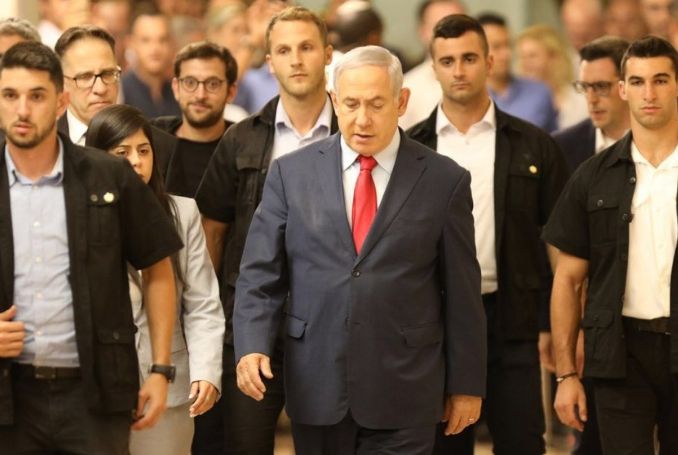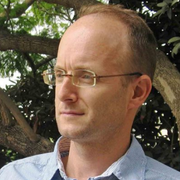
In a sign of how politically vulnerable he has rapidly become, prime minister Benjamin Netanyahu plunged Israel into new elections last week – less than two months after his far-right bloc appeared to win at the ballot box.
Netanyahu was forced to dissolve the 120-member parliament to block his chief rival, Benny Gantz, from getting a chance to assemble an alternative governing coalition.
Gantz, a former army general who heads the Blue and White party, won 35 seats, the same number as Netanyahu’s Likud party, in the April election, but had fewer potential allies to form a majority. So in September, Israelis will cast their votes afresh.
The ostensible reason for the parliament’s dissolution is a stand-off between Netanyahu and Avigdor Lieberman, his former defense minister. They clashed over Lieberman’s insistence that ultra-orthodox Jews be drafted into the army.
But Lieberman, it seems, chose to turn a relatively marginal issue into a full-blown crisis as a way to unseat the prime minister.
To win a far-right majority, Netanyahu needed not only Lieberman’s small Yisrael Beiteinu party but also the ultra-Orthodox parties, which vehemently oppose conscription.
Netanyahu grew so desperate that at the last moment he tried – unsuccessfully – to woo Avi Gabbay, leader of the centrist Labour party. Labour was crushed in April, receiving just six seats, its lowest-ever result.
Netanyahu’s panic was fully justified. He is due to face a hearing in October when it is widely expected he will be indicted on multiple corruption charges.
With parliament’s dissolution, he no longer has time to pass two pieces of legislation that could have absolved him of charges before the October deadline. First, he needed an immunity law exempting him from trial, and then a so-called “override law” to prevent Israel’s supreme court from using its powers of judicial review to rule the immunity law unconstitutional.
Gabbay objected to Netanyahu insisting on support for the immunity law as the price for Labour’s inclusion in the coalition.
Ayman Odeh, leader of the biggest party representing Israel’s Palestinian minority, one-fifth of the population, mocked Netanyahu’s frantic bargaining.
He provoked much mirth from other legislators by joking that Netanyahu had offered an “end to the occupation” and a promise to “recognize the historic wrongs of the Nakba”, the Palestinians’ dispossession by Israel in 1948, in return for Palestinian parties supporting the immunity law.
Lieberman also humiliated Netanyahu, albeit without the humor. He understood that the prime minister was in no position to haggle.
The gain for Lieberman is that by proposing a bill to draft ultra-orthodox Jews into the army, he appealed to secular Jews. That, he hopes, will win him new supporters in the September election, setting him up again to be the kingmaker.
Netanyahu will not be able to count on Lieberman’s support and that in turn puts pressure on Likud to drop its leader.
But there is another, less obvious, way that Lieberman can strengthen his own hand.
The battle lines in the new election, like the last, are between the far-right parties, led by Netanyahu, and the center-right parties, led by Gantz.
Lieberman can now hedge his bets. The far-right has become more overtly religious, with the rise of ideological settlers to prominence and the rapid growth of the ultra-orthodox electorate.
Lieberman’s appeal, meanwhile, has been restricted to a declining constituency of disgruntled immigrants from the former Soviet Union, whose politics is ultra-nationalist but implacably secular.
And this gives him reason to want to influence Gantz’s Blue and White party, which is largely secular too.
In recent weeks, a political “resistance” movement has emerged in Israel against Netanyahu, echoing the one against Donald Trump in the US. With Gantz as its figurehead, it has mobilized over the threat Netanyahu poses to Israel’s system of checks and balances.
The chief concern has been the far-right’s intensifying assault on the supreme court, the last relatively liberal institution. The override law, which would neuter the court, has epitomized, for the center-right, the intensifying erosion of even the most superficial of democratic norms.
Tens of thousands of Israelis attended a protest last month against Netanyahu and his legal maneuvers.
But Odeh, the most prominent of the Palestinian minority’s leaders, was not invited – not until Gantz had a last-minute change of heart.
Without the Palestinian parties’ 10 or more seats in the parliament behind him, Gantz currently has little hope of tipping the balance in his favor against Netanyahu at the forthcoming election.
Lieberman, a settler, has a special loathing for Palestinian legislators. He has even called for them to be executed. One option is for him to lure Gantz away from Odeh, promising that his Yisrael Beiteinu party can serve up the keys to the castle after September’s election.
What does all this jostling mean for the Palestinians?
If he can win again, Netanyahu will doubtless scheme to avert a trial and hope to carry on as before.
If he is felled, a successor from his Likud party is unlikely to prove either more moderate or more amenable to Palestinian ambitions for statehood. Likud has lurched significantly to the far-right over the past decade.
But Gantz, the only plausible alternative, is no peacenik either. He oversaw the terrible destruction of Gaza in 2014, supports keeping most of the settlements in place and seems unlikely to pay more than lip service to a peace process.
Should he find himself reliant on Lieberman to build a government, Gantz will have to emphasize the more right-wing elements of his party’s already hawkish program.
Faced with the current political turmoil, however, the Trump administration might prefer to abandon efforts to press ahead with its “deal of the century” peace plan – at least beyond an initial investment conference scheduled for late June.
That is a reprieve of kinds. All indications were that the plan would prove catastrophically bad for the Palestinians and might have included annexing parts of the West Bank.
But even if that specific threat is lifted, the next Israeli government – whether led by Netanyahu, his successor or Gantz – is not likely to depart from Israel’s long-term consensus, one that the Trump plan was simply set to accelerate.
The settlements will continue their relentless expansion and more Palestinian land will be stolen, eroding any prospect of a viable state for Palestinians emerging.
(A version of this article first appeared in the National, Abu Dhabi.)
– Jonathan Cook won the Martha Gellhorn Special Prize for Journalism. His books include “Israel and the Clash of Civilisations: Iraq, Iran and the Plan to Remake the Middle East” (Pluto Press) and “Disappearing Palestine: Israel’s Experiments in Human Despair” (Zed Books). He contributed this article to The Palestine Chronicle. Visit his website www.jonathan-cook.net.

– Jonathan Cook won the Martha Gellhorn Special Prize for Journalism. His books include “Israel and the Clash of Civilisations: Iraq, Iran and the Plan to Remake the Middle East” (Pluto Press) and “Disappearing Palestine: Israel’s Experiments in Human Despair” (Zed Books). Visit his website www.jonathan-cook.net. He contributed this article to The Palestine Chronicle.







